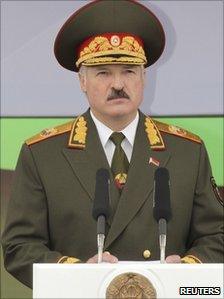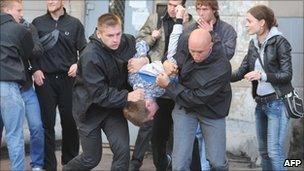Belarus: Lukashenko vows to quell 'revolution plot'
- Published

Mr Lukashenko said he would not allow his government to be overthrown
Belarus President Alexander Lukashenko says recent protests against his rule are an attempt to foment revolution in the former Soviet republic.
He told an Independence Day military parade in Minsk that their goal was to bring Belarus "to its knees", but this was "not going to happen".
Activists say an opposition group's page on a Russian social media site has been blocked to stop further protests.
But police arrested scores trying to disrupt the celebrations in Minsk.
Mr Lukashenko was addressing a large crowd during independence day celebrations marking the end of Nazi occupation in 1944.
He said he viewed public protests as part of a plot to overthrow him.
"(Somebody) is trying to copy a 'coloured revolution' scenario here," he said, referring to protest movements in ex-Soviet republics such as Georgia and Ukraine in 2003-2004.
"We understand that the goal of these attacks is to impose uncertainty and turbulence, to destroy public consent and in the end to put us on our knees and to bring all the achievements of our independence down to zero. This is not going to happen."
Protests are rare in Belarus where the authoritarian rule of Mr Lukashenko has led to sanctions by Western governments.
Demonstrators had been urged to attend the celebrations and start clapping as soon as Mr Lukashenko began his speech.
At least one person who began clapping was quickly led away by plain-clothes police, Reuters news agency reported.
Police and special forces also pounced as about 20 people began clapping outside the central train station in Minsk, witnesses said.
The protest spread to include hundreds of other people nearby. Amid chaotic scenes, many were bundled into police vans but others resisted and blows were exchanged with police.
Police fired tear gas to disperse protesters, AFP news agency reported.
The opposition has held a series of internet-organised marches known as "Revolution by Social Networks", in which protesters do not carry signs but instead walk through the streets clapping in unison.
The group's main page on a Russian social media site was blocked on Sunday, with activists saying it was a deliberate attempt to stifle their efforts.
"The authorities are making a titanic effort to break the wave of civil protests," wrote opposition website Charter 97.

Protesters had vowed to disrupt the celebrations
Valentin Stefanovich, from rights group Vesna, said the government had detained dozens of activists while others had been called in by the security forces and warned not to protest.
Those arrested included Stanislav Shushkevich, the first post-Soviet leader of Belarus and a strong opposition supporter, but he was later released.
"These are clearly illegal actions undertaken to prevent the protest actions called for on the internet," Mr Shushkevich told AFP news agency.
Last month, about 1,000 people gathered in Minsk to take part in a "silent protest" over the economic crisis organised via social networking sites.
In December 2010, authorities cracked down on protests against alleged vote-rigging in the general election.
International monitors said the contest, in which Mr Lukashenko officially won 80% of the vote, was deeply flawed.
- Published30 June 2011
- Published16 June 2011
- Published14 May 2011